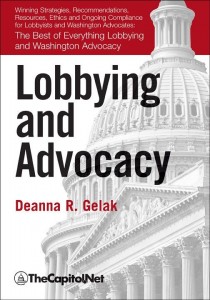Lobbyists should be familiar with the code of ethics adopted by the American League of Lobbyists (ALL), which provides basic guidelines and standards for the conduct of lobbyists.

Honesty and Integrity
Lobbyists should always be truthful in their communications with public officials and with all other interested parties.
Compliance with Laws, Regulations and Rules
Lobbyists should always make certain they are familiar with and comply with all laws, regulations and rules that apply to them.
Professionalism
 Lobbyists must conduct their lobbying activities in a manner that is fair and professional.
Lobbyists must conduct their lobbying activities in a manner that is fair and professional.
Conflicts of Interest
Lobbyists should not undertake any representations that may establish conflicts of interest without the informed consent of the client that is involved.
Due Diligence and Best Efforts
Lobbyists should always diligently and vigorously advocate for the interests of their clients.
Compensation and Engagement Terms
Independent lobbyists who are retained by clients should always have a written agreement with the client regarding the terms and conditions for their services.
Confidentiality
Lobbyists should always maintain appropriate levels of confidentiality of all employer and/or client information.
Public Education
Lobbyists should seek to ensure the public has a better understanding and appreciation of lobbying within the governmental process.
Duty to Governmental Institutions
Along with fulfilling their duties and responsibilities to their employer or client, lobbyists should always ensure they exhibit only the most proper respect for all governmental institutions.
The ALL Code of Ethics has been designed to ensure that lobbying is undertaken in the most proper and appropriate manner possible. It is important that government officials be able to receive information from affected interests that is factual and be aware of the views of those parties in order to make policy judgments that are well informed. The Code of Ethics works toward preserving and advancing public trust and confidence in democratic institutions and the public policy advocacy process. Professional lobbyists should recognize that they have a strong obligation to conduct themselves in the highest moral and ethical manner possible in all of their dealings with public officials and all other parties. While the Code of Ethics is only intended to apply to independent lobbyists, all lobbyists should seek to practice the highest ethical conduct possible in their lobbying efforts.
Reference: Lobbying and Advocacy, by Deanna Gelak, Appendix 6: Lobbyists’ Code of Ethics.
Courses
- Congressional Operations Briefing – Capitol Hill Workshop
- Congressional Dynamics and the Legislative Process
- Drafting Federal Legislation and Amendments
- Understanding Congressional Budgeting and Appropriations
- Advanced Legislative Procedure
Publications
CongressionalGlossary.com, from TheCapitol.Net
For more than 40 years, TheCapitol.Net and its predecessor, Congressional Quarterly Executive Conferences, have been teaching professionals from government, military, business, and NGOs about the dynamics and operations of the legislative and executive branches and how to work with them.
Our custom on-site and online training, publications, and audio courses include congressional operations, legislative and budget process, communication and advocacy, media and public relations, testifying before Congress, research skills, legislative drafting, critical thinking and writing, and more.
TheCapitol.Net is on the GSA Schedule, MAS, for custom on-site and online training. GSA Contract GS02F0192X
TheCapitol.Net is now owned by the Sunwater Institute.
Teaching how Washington and Congress work ™

